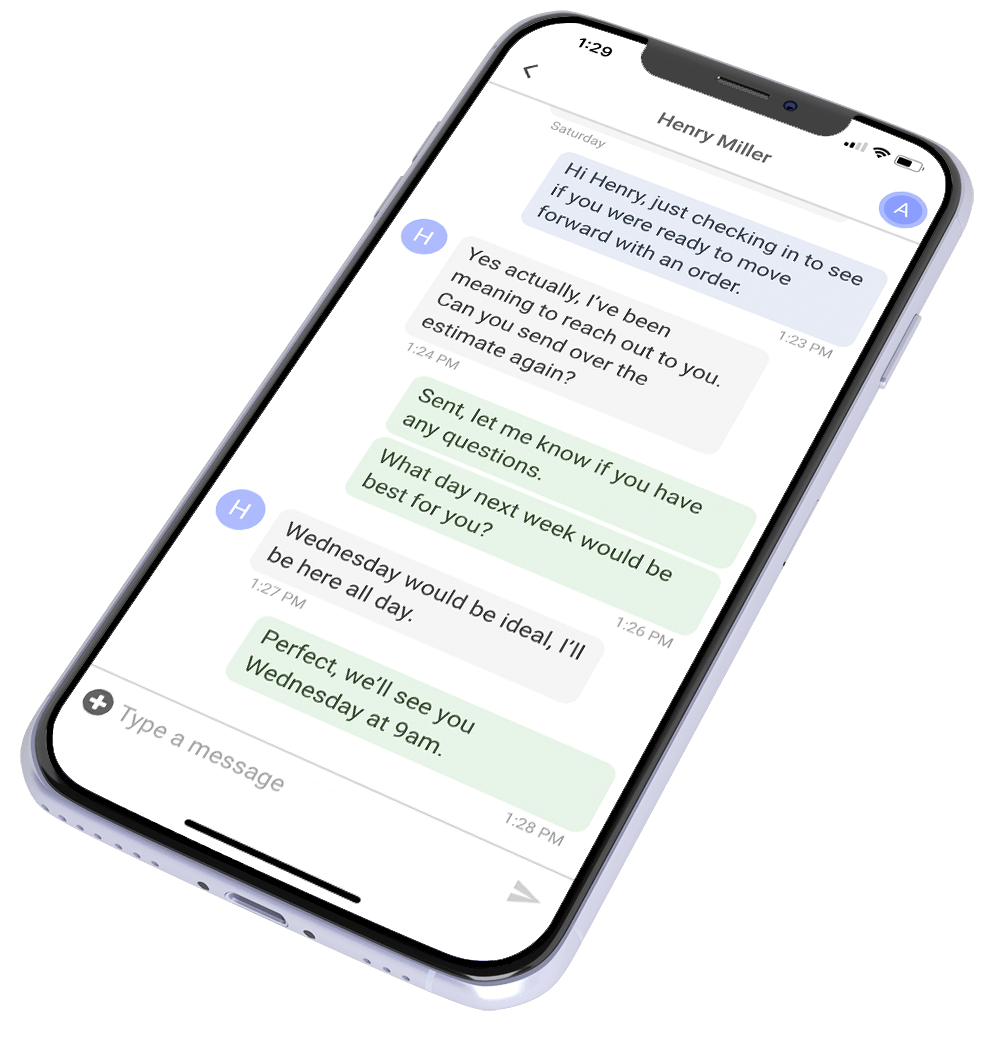Roofing Software is a non-negotiable in 2024.
Does your roofing business run like a well-oiled machine? Every project goes off without a hitch. Customer interactions and financial transactions happen as they should. No hiccups, just smooth sailing.
Sounds like a dream, right? After all, no business will ever be perfect. But boosting your efficiency even a little can make your daily life far easier. And that’s what roofing software can do. It can take headaches that seem unsolvable and dissolve them into thin air. In fact, that’s what it should do!
Here are four types of roofing software every roofer should use to make their life easier.

Project Documentation Roofing Software
In roofing, taking pictures isn’t a form of expression or art. It’s a must. Keeping a visual record helps show clients what’s happening on their roof. It helps you make sales and track job progress.
Taking photos helps you stay on top of every detail. Regular updates let you check the quality and timeline of the work. If there are issues, you can spot them early and fix them fast, stopping small problems from getting big. This not only improves the work but also saves time and money.
But have you tried keeping track of photos? Even worse, have you tried sharing them with your whole team? It’s a nightmare. Sure, you can use free tools like Google Drive or even your laptop’s hard drive. But you’ll eventually slam into a wall.
That’s where project documentation roofing software can make your life way better. They don’t just help you stay on top of pictures. They can help you sort, share, and track documents.
What to Look For
First, it should be easy to take and organize photos. Snapping and uploading pictures should be simple and keep your workflow moving.
Another important feature is integration with CRM and other management tools. If your photo roofing software syncs with your CRM, all client interactions and project details stay in one place. This helps your team access the latest info, making it easier to work together.
Case Study: CompanyCam
CompanyCam is the industry standard for project documentation. It’s changed how roofing companies document and manage projects. No wonder! A roofer founded CompanyCam to make his photo sorting problem go away. That’s why it lets you store photos, documents, and more and organize them all by project.
CompanyCam also makes communication easy with clients and team members. You can share photos and updates with clients, keeping them informed and involved. Team members can access the latest photos and notes, ensuring everyone is on the same page. This leads to smoother projects and happier clients.
Plus, they integrate with most CRMs. For instance, you can link projects in ProLine with CompanyCam projects. You can see photos, documents, texts, emails, calls, and voicemails in one easy-to-find place!
Aerial Measurement Roofing Software
Accurate measurements are a must for any roofing job. If your numbers are off, you could order the wrong amount of materials. This can delay the project, cost more money, and annoy your client. The better your measurement tools, the less money you waste and the more you make in profit.
Modern Tools for Measuring
Today, drones and satellite images are must-haves for roofers. Drones take clear pictures and measure roofs without anyone climbing up on the roof. It’s safer and faster to get estimates to clients. You get fast, accurate measurements in record time for a relatively low cost.
Example: EagleView
EagleView is a top-notch aerial measurement tool. It uses drones and satellites to get exact roof measurements. Once you pay for the report, you get detailed data on roof size, slope, and area.
EagleView integrates with most quoting and project management roofing software. That means you don’t have to enter data by hand. You automatically get measurements fed into your quotes. For example, you can plug EagleView measurements into a pre-made ProLine quote template. That template can then give a price estimate based on the roof size. No more driving out and measuring roofs by hand. It’s all done for you for a small price per report.
EagleView isn’t the only aerial measurement roofing software on the market. But it’s an industry leader for a reason!
A CRM Built For Roofers
Ever lost track of a possible customer or forgotten to follow up on a sale? It’s annoying, right? A good CRM software stops these problems. It gives you one place for all your customer info.
With a CRM, you don’t file away contacts. You build relationships. Every conversation, from the first call to finishing the project, gets recorded. It helps you turn leads into 5-star reviews for your business.
Automated Communication Tools (Calls, Texts, Emails)
A great CRM helps you talk to your customers without you ever picking up the phone. They can send calls, texts, and emails automatically based on set times and actions.
For example, when someone fills out a form on your website, they get a welcome email right away. The next day, they get a follow-up text about your services. This way, no lead gets forgotten. Every potential customer gets timely messages. This makes your business look professional and reliable.
Automated tools don’t just make things easier. They create a smooth and quick experience for your customers. It’s a far cry from your competitors who still do things by hand. Most of the leg work of moving leads through your funnel gets done without you lifting a finger!
Making Your CRM Work for You
Another cool thing about a great CRM is that you can customize it to fit your needs. Every roofing business is different, so one-size-fits-all doesn’t work. With a customizable CRM, you can set it up just the way you need. You can add custom fields, create workflows, and generate reports based on how you do business.
For example, if you do both home and business roofing, you can set up your CRM to handle these jobs differently. You can have different steps and stages for each type of project. You can also customize reports to track what matters most to you, like how many leads you get, conversion rates, or how long it takes to close a deal.
A customizable CRM also helps your team use it better. You can set up user interfaces and permissions based on roles. This ensures everyone, from sales reps to project managers, has the tools and info they need. This leads to better teamwork, more productivity, and more sales.
Full disclosure: ProLine is a CRM. That’s why we have so much to say about what makes a good CRM. If you want to see what we can do for your business, book a demo! We’ll show you how you can set up ProLine to hit home run after home run for your roofing business.
Oh, or you could get started for free. That’s because ProLine offers a fully functioning free roofing CRM. Learn more about it to get started!
Bookkeeping Software
If there’s one thing that throws roofers off course, it’s managing the money. Sometimes it’s foolish spending and behavior. We all know a few of those stories! But often, it’s a lack of information. They don’t have a full picture of their finances. Their decisions aren’t exactly based on reality.
That’s where a good bookkeeping software can help! It makes it easy to track all your earnings and spending. You can go from throwing darts at a board to making precision strikes based on the data.
Key Features
Good bookkeeping software has tools that make managing money easier. One key feature is invoicing, which lets you bill clients quickly and accurately. Automated invoicing saves time and ensures you get paid on time, improving cash flow. You’ll need bookkeeping software that directly integrates with your business bank account. Otherwise, those invoicing features can get clunky fast!
Another important feature is payroll management. Handling payroll by hand can be hard and time-consuming. Financial software automates payroll, tax withholdings, and payments. This saves time and ensures employees get paid correctly and on time, which keeps them happy and productive.
Expense management is crucial too. Tracking every expense helps you see where your money goes. Financial software lets you categorize and monitor expenses, showing where you can save money or need to spend more.
Example Software: QuickBooks
QuickBooks is a top example of financial management software. QuickBooks handles invoicing, payroll, expense tracking, and financial reporting all in one place. It’s popular with roofers because it’s easy to use and does a lot.
The invoicing feature lets you create professional invoices quickly and customize them to match your brand. It also sends automated reminders for overdue invoices, helping keep cash flow steady. The payroll feature automates the payroll process and ensures you follow tax rules.
QuickBooks is also great at expense management too. It tracks and categorizes expenses easily. You can link your bank accounts and credit cards to QuickBooks, so all transactions get recorded automatically.
The real-time reporting and analytics in QuickBooks are a big plus. It gives you detailed reports on your finances, which you can customize to focus on what matters most to your business. Whether you need a quick overview or a detailed analysis, QuickBooks provides the insights you need.
Conclusion
Running a successful roofing business takes more than hard work on the roof. You need the right tools to stay ahead and keep things running smoothly. Let’s go over the four key roofing software types every roofing company needs to thrive:
1. Job Photos and Reporting for Project Transparency
Taking pictures of your projects is super important. It helps you track progress and stay transparent with clients. Roofing software like CompanyCam lets you document each stage of a project easily. This gives clients real-time updates and builds trust. Keeping clients informed makes them happy and engaged.
2. Aerial Measurement for Accurate Planning
Accurate measurements are key for good project estimates and material orders. Tools like EagleView use drones and satellite images to get exact measurements. That means you can create accurate quotes with far less effort.
3. CRM for Customer Management and Communication
A CRM system is like the brain of your client interactions. It helps you manage relationships, track leads, and follow up on time. That means you earn more money for less work. What’s not to love about that?
4. Financial Management for Keeping Finances in Check
Bookkeeping software like QuickBooks tracks expenses handles payroll, and generates real-time financial reports. It gives you a clear view of your finances and helps you make smarter decisions.
Put the ibuprofen down. That’s a temporary fix for your roofing business headaches. Invest in the right roofing software, and your life’s going to get far easier.
Need a CRM that actually helps you manage customer relationships? Then check out ProLine. Think of it like a CRM with WhatsApp built into it. It lets you call, email, and text leads straight from the app. Book a demo to see it in action.



